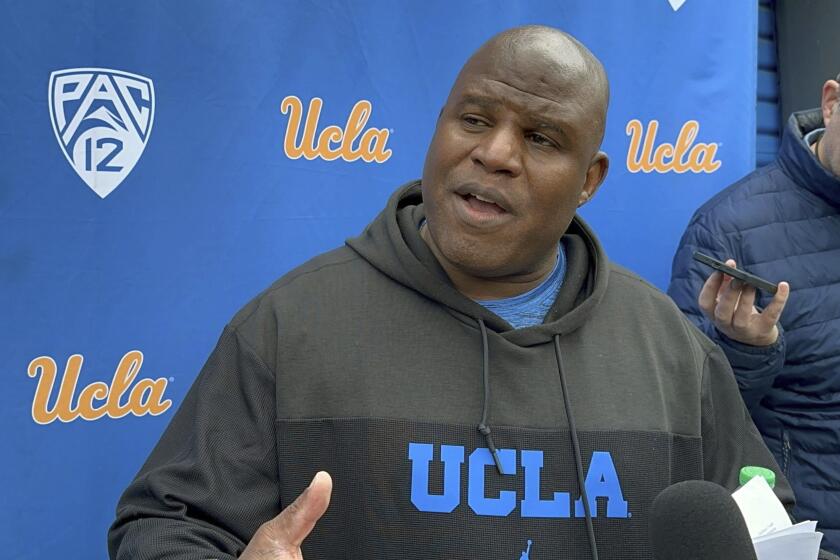Peter V. Ueberroth
Since he burst into public life two decades ago as head of the 1984 Los Angeles Olympics, Peter V. Ueberroth has spoken extensively on his views of business, government and the problems that ail California. His reputation for tough management tactics and quick mood flashes is reflected in sharp words.
Far more introspective than most politicians, Ueberroth often examines his own failings as brutally as those of others.
On CNN’s “Larry King Live,” for example, he berated himself for shunning the nation’s inner cities in his travel business.
“I started my business before the ’65 riots and I said, ‘hat’s not a very good place to go.’ And that was a mistake,” he told a caller.
*
Government and Private Sector
Ueberroth’s widely acclaimed success in bringing off the 1984 Olympics without government subsidies gave him license to proclaim the private model as a solution for public problems.
“Government doesn’t move fast enough to get a job done that’s that big, and has an absolute deadline for completion,” he said of the Olympics. “I think it would have been impossible to achieve the same kind of success, not only financially, but in a lot of other areas.”
But, as baseball commissioner, he called on local governments to help prop up their teams.
“Where government is not supportive of baseball, baseball does not do well,” he told the Houston City Council in 1986.
On launching what became a frustrating and unsuccessful assignment, heading the Rebuild L.A. committee after the 1992 Los Angeles riots, Ueberroth again went back and forth on the preeminence of private enterprise.
“Frankly, America doesn’t solve problems unless it’s done by the private sector,” he told the San Francisco Examiner in 1992.
Later, he expanded the model into a “tripod” of private enterprise, community involvement and government and began berating government as the weak leg.
“Government has not done anything meaningful to help rebuild Los Angeles,” he told The Times. “I don’t expect to get everything, but this is an arrogant, non-caring reaction.”
“I am beyond frustration,” he told the Wall Street Journal. “How can these people, Democrats and Republicans, hold their jobs and not make one attempt to make things better in the inner city?”
“People have never had a chance in the inner city,” he said on CNN News. “They’ve not enjoyed all the benefits that the suburbs have, so the government’s got to change that.”
*
The California Economy
Ueberroth’s optimistic character is sometimes shaken by a darker view that “the screamers are heard, the screamers take center stage, and the doers are ignored,” as he told The Times in 1992. “The problem that happens then is that there become less and less doers.... The doers are either ignored or beat up upon or scoffed at.”
Ueberroth did some screaming of his own in reporting the conclusions of Gov. Pete Wilson’s Council on California Competitiveness in April 1992.
“We’re frightened about this state’s future,” he told reporters. “We started out being worried and we ended up with a conclusion that things are much worse than we expected, much worse than you know.... We’re on the precipice and about ready to drop off.”
Ueberroth said the state had become a “job-killing machine” because of its unfavorable environment for business.
*
Public Service
Ueberroth has voiced ambitions for public service that have not all been fulfilled.
“If I do serve government at any time, it will probably be something appointed, and running something that’s a disaster,” Ueberroth told The Times in 1988.
At one point, he thought his calling might be the war on drugs.
“If there were such a thing in the government as a czar of drug-fighting in this country, and somebody asked me to do that, I’d be hard-pressed to say no,” he said as his years in baseball wound down.
The position was created, but then-President George H.W. Bush appointed someone else to it.
Initially, Ueberroth had soaring plans for Rebuild L.A.
“Our goals are long-term, systemic change,” he told The Times in July 1992. “The last thing we need is to get a lot of people to rush out with goody-goody gestures that will not last.”
Three months later, his optimism was shaken.
“The obstacles are much more formidable than I thought,” Ueberroth said.
And within the year, he withdrew, saying the focus of attention had become too much on one individual.
“It’s important ... as we go into Year 2 that the focus is different -- that it’s not Peter Ueberroth,” he said.
*
On Himself
“I am among those few,” he wrote in the foreword to his 1985 autobiography, playing on the Winston Churchill quotation: “...few are those” who see private enterprise “as a sturdy horse pulling the wagon.”
Ueberroth acknowledged that he had been rough on employees of the Los Angeles Olympic Committee, and defended his style.
“These were not normal practices, not normal business practices,” he told a Times reporter. “It wasn’t a time for kindness, to take the time and help people through problems, and people had to be moved aside and shunted. And all that happened. But the result worked.”
The verbal lashings were for effect, he said, to set an example, and, “Normally, the people that I criticized were those I had the greatest faith in. Usually, the closer the friend, the tougher the complaint.”
Ueberroth has never accepted responsibility for the worst stain on his career, charges that the baseball owners colluded to restrict the bargaining power of free agents in the 1980s when he was commissioner of baseball.
Though arbitrators ordered the owners to pay the players more than $280 million, Ueberroth has said the owners’ actions were reasonable to stop a flood of red ink.
“I don’t think there was any actual collusion,” he told The Times in 1988. “I think there was cultural change, an embarrassment.... It was like a sore each one had that they didn’t want to expose. But once it was exposed they said this is not a sore, this is a disease. But I think that it will all smooth over.”
Ueberroth has always relished a personal challenge.
“Most likely, I’ll try to find a major corporation that’s in trouble,” he told Sports Illustrated, looking ahead in 1982. “That’s the fun of doing something. The bigger the company and the more disastrous its position, the more it would interest me.”
More to Read
Go beyond the scoreboard
Get the latest on L.A.'s teams in the daily Sports Report newsletter.
You may occasionally receive promotional content from the Los Angeles Times.











